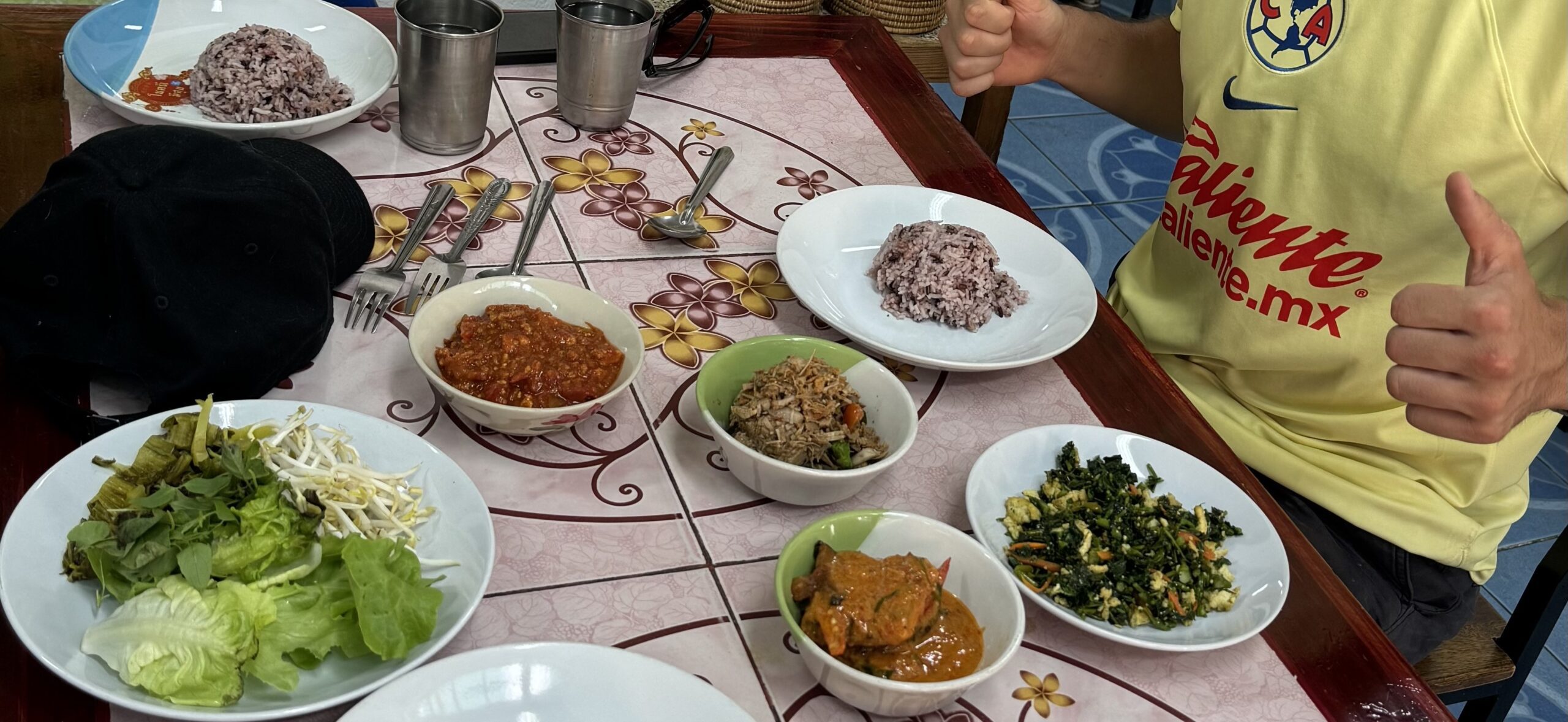By Josh Butterworth. Josh is Impact Teaching’s Thailand Program Coordinator, and he lives in Thailand.
Your first 24 hours after stepping off the plane and into the scorching Bangkok heat will pass in a blur. You’ll eat, drink and be merry as you take in the sights, smells and excitement of it all – not for a second will you stop to think about what you’re spending or how much things cost. And that’s how it should be!
The cost of living in Thailand compared to ‘back home’, wherever that me be, is likely to be significantly less. You can absolutely live cheaply here, but you’ll easily overspend if you maintain the attitude that you can afford whatever you want, whenever you want.
I’m here to give you some money saving tips that will help keep costs down, so that money never becomes an issue and you can enjoy your experience to the fullest. Although Thailand is cheap – it’s not free.
This week, we’re going to talk about everyone’s favourite subject – food!
Three times a day, sometimes more, sometimes less – we all have to eat. I have two bits of good news for you, the food in Thailand is INCREDIBLE and it doesn’t break the bank. Eating breakfast, lunch and dinner at local restaurants is unlikely to cost more than £7 a day, let’s round it up to £8 with snacks and drinks. That’s less that £250 a month! Sounds too good to be true? It’s not, but here are a few guidelines to help you achieve this…
Eat local food / Limit Western food
Salty, sweet, sour, spicy and bitter. These five core elements of Thai cuisine combine to create a truly special culinary experience that will leave you coming back again and again. There’s far more to Thai food than pad Thai and green curry, and in Thailand, you have unlimited options at your fingertips. You’ll come across so many dishes that 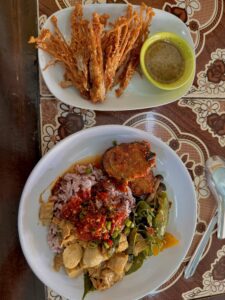 you’ve never heard of, my
you’ve never heard of, my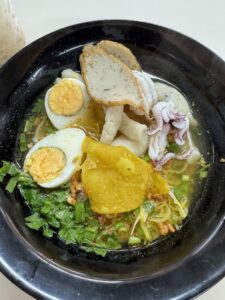 advice, give them a try. Unlike in the West, flavor does not decrease with cost, so head into any streetside restaurant or stall and expect to pay a little for a lot.
advice, give them a try. Unlike in the West, flavor does not decrease with cost, so head into any streetside restaurant or stall and expect to pay a little for a lot.
But every now and then you may need a more familiar taste – a pizza, burger or anything without fish sauce and chilis. I get it, I’ve been there. You can find Western food throughout Thailand, it will just be a bit more expensive and might not quite be what you’re expecting. But if you need to, go for it, just try to save it for special occasions or when you’re feeling a bit homesick. It’s not financially sustainable to eat Western food every day. And if there’s a choice between a restaurant full of foreigners that has an English menu, or one full of Thais, you should know by now which one to pick. Trust me when I say, it’ll taste better and cost a lot less.
Go out to eat / Limit food delivery
I don’t know why, but I always feel fuller and happier when I go out to eat. It’s also a bit cheaper than food delivery. You get the chance to practice your Thai, have social interactions and a more fulfilling experience overall. It’s another opportunity to people watch and soak up 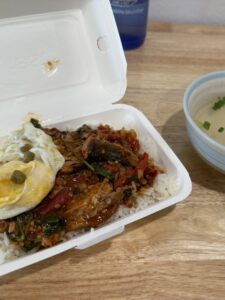 culture as families eat together and the waiters work hard in the blistering heat. Thai’s take pride in their food, they put passion and love into it, and you get a lot clearer idea of this when you’re in the
culture as families eat together and the waiters work hard in the blistering heat. Thai’s take pride in their food, they put passion and love into it, and you get a lot clearer idea of this when you’re in the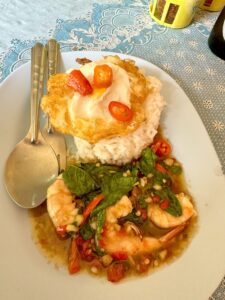 place it was designed to be enjoyed.
place it was designed to be enjoyed.
However, after a long day of teaching, you may not want to venture out. Luckily, Foodpanda and other food delivery apps are a relatively cheap and incredibly convenient option. Before you have a Thai bank account, you can either pay in cash on arrival or link any card you have. On Foodpanda, most of the menus are in English and have pictures, you can get all sorts of food from local dishes to sushi and steak. But as I have already implied, although it may be a lot cheaper than in your home country, orders and delivery fees can add up. I currently get food delivered at least once a day, it’s a great option to have, but I recommend going out to eat if you can – for a better price, experience and flavor.
Aim for less than 100 baht per meal / Monitor your spending on drinks
In time, you do get used to what things cost and will start thinking in baht (currency in Thailand) rather than the currency of your home country. But a good guide to start you off while you find your feet is aiming to spend no more than 100 baht per meal, that’s just over £2. I don’t always stick to this myself, of course, there are exceptions when you’re going out with friends or fancy that cheesy deluxe pizza to 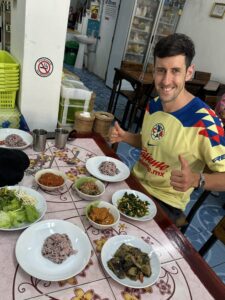 remind you of home. But you can easily find a delicious pad Thai for 60 baht, some spicy papaya salad
remind you of home. But you can easily find a delicious pad Thai for 60 baht, some spicy papaya salad and sticky rice for 50, or a big bowl of meaty soup noodles for 80 – all less than 100 and well within budget! Just stick to local restaurants and try not to overorder, you can always get more if you’re still hungry.
and sticky rice for 50, or a big bowl of meaty soup noodles for 80 – all less than 100 and well within budget! Just stick to local restaurants and try not to overorder, you can always get more if you’re still hungry.
Your spending also increases when you add coffee and other drinks into the equation. Water is very cheap, and a necessity with the hot weather and spicy food. Just remember that you cannot drink tap water, always go for bottled or nip to one of the many refill stations that can be found throughout residential neighborhoods. Thailand is home to some of the best coffee in the world but the prices vary a lot. You can pick up an incredibly sweet, iced coffee from a street vendor for around 25 baht, very cheap. Or a more artisan, and delicious, coffee from a shop for around 60 baht. Just be aware that getting a few coffees or teas everyday adds up. As does alcohol, limit it as much as you can and always be aware of how much your spending each month.
Eating in Thailand is an absolute joy. It was a big part of the reason I came back, in all honesty. Being able to eat a wide variety of incredibly delicious food without breaking the bank is truly a privilege. As I write this, I’ve been back in the country for just over two weeks, and I’ve not cooked once. I love cooking, but the options here are endless and I don’t feel guilty parting with less that £10 every day on food. But it is possible to overspend if you eat Western food and don’t track what you are spending, so keep an eye on it and you’ll be very happy, full and satisfied eating all the delights Thailand has to offer – without any money concerns!
Don’t be a tourist. Live like a local.
Here at Impact Teaching, we can help you get started in Thailand, as we work with schools throughout the country.
Check out our program page, and get in touch.
Or contact me, Josh, on josh@impact-teaching.com
Speak soon!

